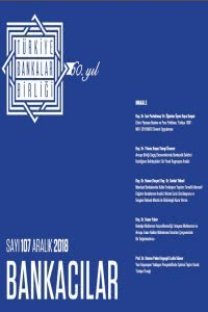Kredi Kartı Sorunları, Finansal Okuryazarlık ve Finansal Eğitim
Çalışmamızda, Türkiye genelinden rassal olarak seçilmiş 2576 kişiyle yapılan anket verileri kullanılarak, tüketicilerin kredi kartı kullanma pratikleri incelenmektedir. Yaşanan kredi kartı temerrüt ve takip sorunlarını azaltmak için bu pratiklerde iyileştirilmesi/düzeltilmesi gereken yönler olup olmadığı araştırılmaktadır. Tüketicilerin özellikle taksitlendirme ve tüketimi zamana yayma isteği ile kart edindikleri, genellikle kredi kartı hizmetleri ve diğer bankacılık hizmetlerini bir paket olarak gördükleri, kart edinirken kartların bonus, mil, prestij gibi fiyat dışı özelliklerine, faiz ve yıllık kullanım ücreti gibi fiyat özelliklerinden daha çok önem verdikleri görülmektedir. Ayrıca, temerrüt ve takip sorunu yaşayan kullanıcıların ciddi finansal okuryazarlık sorunları olduğu tespit edilmiştir. Bu tür kullanıcıların, kredi kartı faiz oranlarını bilmedikleri, kredi kartları ile ne zaman ve nasıl borçlanılması gerektiğini anlamadıkları, ödeme kolaylıkları nedeniyle gereksiz alışveriş yapabildikleri, bütçeleme yapamadıkları, yapısal sorunlarını çok pahalı bir finansman yöntemi olan kredi kartları ile çözmeye çalıştıkları anlaşılmaktadır. Özellikle bu tür kullanıcıları hedefleyen finansal eğitim programlarının, hem kişilerin refahının artırılmasına, hem de ekonomilerin daha istikrarlı hale getirilmesine katkıda bulunacağı düşünülmektedir.
Credit Card Problems, Financial Literacy and Financial Education
Using a nationwide survey conducted with randomly selected 2576 credit card holders, we investigate consumers' credit card practices. We try to understand whether some of these practices should be improved/corrected to be able to reduce credit card delinquency and default incidence. We observe that consumers obtain credit cards mainly for consumption smoothing purposes, that they mostly view credit card services and general banking services as a bundle, that they pay more attention to the nonprice attributes of their credit cards like bonus points, travel miles and prestige than the price attributes like interest rates and annual fees. Moreover, consumers, especially those who experienced delinquency and default problems, seem to have severe financial literacy problems. We observe that such consumers do not know the interest rates of credit cards, that they do not understand when and how to borrow on credit cards, that they can do unnecessary shopping due to payment facilities of credit cards, that they can not manage their budgets, and that they try to solve their structural problems with a very costly way of financing. We believe that financial education programs, especially targeting such consumers, are likely to improve both the welfare of individuals and the stability of economies.
___
- Akın, G.G., Aysan, A.F., Kara, G.I. ve Yıldıran, L. (2011). Non-Price Competition in the Turkish Credit Card Market. Contemporary Economic Policy, 29(4), 593-604.
- Akın, G.G., Aysan, A.F., Boriçi, D. ve Yıldıran, L. (2013). Regulate One Service, Tame the Entire Market: Credit Cards in Turkey. Journal of Banking and Finance, 37, 1195-1204.
- Atkinson, A. ve Messy, F. (2012). Measuring Financial Literacy. OECD Working Papers on Finance, Insurance and Private Pensions, 15.
- Ausubel, L.M. (1991). The Failure of Competition in the Credit Card Market. American Economic Review, 81(1), 50-81.
- Calem, P.S.,ve Mester, L.J. (1995). Consumer Behavior and the Stickiness of Credit-Card Interest Rates. American Economic Review, 85(5), 1327-1336.
- Calem, P.S., Gordy M.B., ve Mester, L.J. (2006). Switching Costs and Adverse Selection in the Market for Credit Cards: New Evidence. Journal of Banking and Finance,30, 1653-1685.
- Campbell, J. Y. (2006). Household Finance. The Journal of Finance, 61(4), 1553-1604.
- Chen, H. ve Volpe, R.P. (1998). An Analysis of Personal Financial Literacy Among College Students. Financial Services Review, 7(2), 107-128.
- Choi, J.J., Laibson, D. ve Madrian, B.C. (2010). Why does the law of one price fail? An experiment on index mutual funds. Review of Financial Studies,23(4), 1405-1432.
- Disney, R., ve Gathergood, J. (2011). Financial literacy and indebtedness: New Evidence For UK Consumers. 29 Mart 2917 tarinde https://papers.ssrn.com/sol3/papers.cfm?abstract_id=1851343 adresinden erişildi.
- Gathergood, J. (2012). Self-Control, Financial Literacy And Consumer Over-Indebtedness, Journal of Economic Psychology, 33, 590-602
- Kempson, E. (2002). Over-indebtedness in Britain, A Report to the Deparment of Trade and Industry.
- Lachance, M.J., Beaudoin, P. ve Robitaille, J. (2006). Quebec Young Adults' Use of and Knowledge of Credit . International Journal of Consumer Studies, 30, 347-359.
- Lusardi, M., ve Mitchell, O.S. (2007). Financial Literacy and Retirement Preparedness: Evidence and Implications for Financial Education. Business Economics, 4(21), 35-44.
- Lusardi, M., ve Mitchell, O.S. (2008). Planning and Financial Literacy: How Do Woman Fare?. American Economic Review, 98(2), 413-417.
- Lusardi, M., ve Tufano, P. (2009). Debt Literacy, Financial Experiences, and Overindebtedness.National Bureau of Economic Research, Working Paper Series, 14808.
- Moore, D. (2003). Survey of Financial Literacy in Washington State: Knowledge, Behavior, Attitudes, and Experiences. Technical Report 03-39, Social and Economic Sciences Center, Washington State University, Pullman, WA.
- Norvilitis, J.M., Szablicki, P.B. ve Wilson, S.D. (2003). Factors Influencing Levels of Credit-Card Debt in College Students, Journal of Applied Social Psychology, 33(5), 935-947.
- Scholnick, B., Massoud, N., Saunders, A., Carbo-Valverde, S., ve Rodriguez-Fernandez, F. (2008). The Economics of Credit Cards, Debit Cards and ATM: A Survey and Some New Evidence. Journal of Banking and Finance, 32, 1468-1483.
- Schooley, D.K. ve Worden, D.D. (2010). Fueling the Credit Crisis: Who Uses Consumer Credit and What Drives Debt Burden?. Business Economics, 45(4), 266-276.
- Stavins, J. (2000). Credit Card Borrowing, Delinquency and Personal Bankruptcy, New England Economic Review, July/August, 15-30.
- The World Bank (2013). Making Sense of Financial Capability Surveys around the World.
- ISSN: 1300-0217
- Başlangıç: 1990
- Yayıncı: Türkiye Bankalar Birliği
Sayıdaki Diğer Makaleler
Kredi Kartı Sorunları, Finansal Okuryazarlık ve Finansal Eğitim
G. GÜLSÜN AKIN, Levent YILDIRAN
Gelişmiş ve Yükselen Ekonomilerde Krizlerin Banka Performansına Etkileri
Spot ve Vadeli Piyasa İlişkilerine Markov Rejim Değişim Modelleri Yaklaşımı
Finansallaşma Çağında Eşitsizliklerin Görünümü ve Devletin Rolü
Finansal Kısıtlar, Döviz Kurları ve Firmaların Yaşama Şansları Üzerine Bir İnceleme
